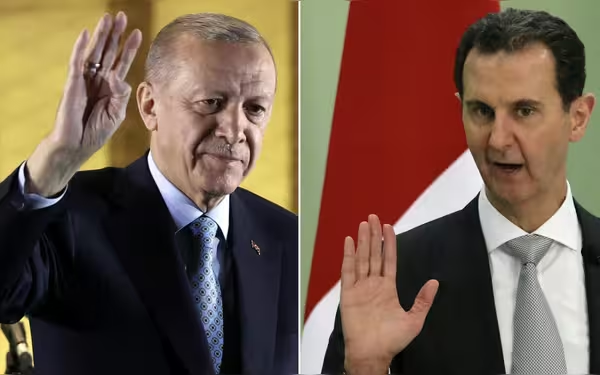Saturday, November 16, 2024 03:16 PM
Erdogan Seeks Meeting with Assad to Normalize Turkey-Syria Relations
- Erdogan aims to normalize Turkey-Syria relations.
- Tensions rise amid ongoing Gaza conflict.
- Turkey hosts 3.2 million Syrian refugees.
 Image Credits: arabnewspk
Image Credits: arabnewspkErdogan expresses desire to meet Assad to normalize relations amid rising tensions in the region.
In a significant diplomatic move, Turkish President Recep Tayyip Erdogan has expressed his desire to meet with Syrian President Bashar Assad during the upcoming United Nations talks in New York. This meeting aims to normalize relations between Turkey and Syria, which have been strained since the onset of the Syrian civil war in 2011. Initially, Erdogan supported rebel groups attempting to overthrow Assad, but recent months have seen a shift towards reconciliation.
Erdogan stated, "We are now waiting for the other party’s response," indicating that he is hopeful for a positive reply from Assad. This potential meeting comes at a time when tensions in the region are high, particularly due to the ongoing conflict in Gaza, which has raised concerns about the possibility of broader regional instability.
During his upcoming address at the UN General Assembly, Erdogan plans to focus on the situation in Gaza, emphasizing that "Gaza would be at the center" of his discussions. He has expressed Turkey's commitment to playing a role in ending the violence and atrocities occurring in the region. Erdogan's remarks reflect a growing concern that the conflict in Gaza could spill over into neighboring areas, further complicating an already volatile situation.
Recent Israeli air strikes on Lebanon have heightened these fears, particularly following attacks on communication systems used by Hezbollah, which resulted in numerous casualties. Erdogan remarked, "The recent attacks led by Israel against Lebanon have justified Turkiye’s concerns about the risks of an extended conflict." He underscored Turkey's determination to act against what he described as the "storm of deaths that global Zionism is unleashing in the Middle East." This statement highlights Turkey's position on the ongoing conflicts and its desire to take a more active role in regional peace efforts.
Furthermore, Erdogan has called upon Western nations and the international community to "stop watching the murders committed by Israel and take deterrent measures." This plea underscores Turkey's frustration with the perceived inaction of global powers in addressing the humanitarian crises unfolding in the region.
Turkey currently hosts approximately 3.2 million Syrian refugees, a testament to the ongoing humanitarian impact of the Syrian conflict, which has claimed over 500,000 lives and displaced millions since it began. The complexities of these intertwined conflicts illustrate the urgent need for diplomatic solutions and collaborative efforts to restore peace and stability in the region.
As the world watches these developments, the potential meeting between Erdogan and Assad could mark a pivotal moment in Middle Eastern diplomacy. It raises questions about the future of Turkish-Syrian relations and the broader implications for regional security. The international community must remain vigilant and proactive in addressing these challenges, as the stakes are high for millions affected by the ongoing conflicts.













